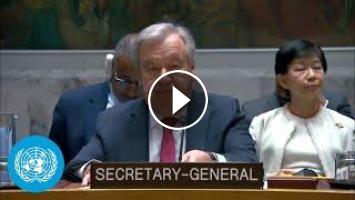Briefing by António Guterres, United Nations Secretary-General, addressing evolving threats in cyberspace.
"Mr. President His Excellency Cho Tae-yul, Foreign Minister of the Republic of Korea, Excellencies,
I thank the Republic of Korea for convening this high-level debate on an issue that affects us all — peace and security in cyberspace.
Mr. President,
Breakthroughs in digital technologies are happening at warp speed — from information and communication technologies and cloud computing, to blockchain, 5G networks, quantum technologies and more.
Digital advances are revolutionizing economies and societies.
They are bringing people together…
Delivering information, news, knowledge, and education at the tap of a screen or click of a mouse…
Providing citizens with access to government services and institutions...
And supercharging economies, trade and financial inclusion.
But the very quality of seamless, instant connectivity that powers the enormous benefits of cyberspace can also leave people, institutions and entire countries deeply vulnerable.
And the perils of weaponizing digital technologies are growing by the year.
Cyberspace has kicked the doors wide open.
Anyone can walk through.
And many are.
Malicious activity in cyberspace is on the rise by both State and non-state actors, and by outright criminals.
Serious cybersecurity incidents are disturbingly common.
From breaches of essential public services like healthcare, banking and telecommunications.
To relentless illicit activity, including by criminal organizations and so-called “cyber mercenaries.”
To a legion of hate merchants littering the information superhighway with fear and division.
To the increasing use of cyberspace as another weapon in ongoing armed conflicts.
So-called civilian “hacktivists” are entering the fray, and in many cases are blurring the line between combatants and civilians.
And the growing integration of digital tools with weapon systems, including autonomous systems, presents new vulnerabilities.
At the same time, the misuse of digital technology is becoming more sophisticated and stealthy.
Malware, wipers and trojans are proliferating.
AI-enabled cyber operations are multiplying the threat, and quantum computing could break down entire systems with its ability to breach encryption.
Software vulnerabilities are being exploited and cyber-intrusion capabilities are even sold over the Internet.
And companies’ supply chains are being actively targeted by hackers, with serious, disruptive and cascading effects.
Ransomware is one grievous example — a huge threat to public and private institutions and the critical infrastructure people depend on.
According to some estimates, total ransomware payments reached $1.1 billion USD in 2023.
But far beyond the financial costs are the costs to our common peace, security and stability — both within countries and among them.
Malicious activity that undermines public institutions, electoral processes and online integrity erodes trust, fuels tensions, and even sows the seeds of violence and conflict.
Mr. President,
Digital technology offers an incredible opportunity to create a more just, equal, sustainable and peaceful future for all.
But breakthroughs must be oriented towards the good.
The New Agenda for Peace places prevention at the heart of all peace efforts.
It calls for developing strong frameworks in line with international law, human rights and the UN Charter, and focused efforts by all States to prevent the extension and escalation of conflicts within, and through, cyberspace.
As reflected in the New Vision for the Rule of Law, the rule of law must exist in the digital sphere as it does in the physical world.
I also welcome the General Assembly’s commitment to action in this area.
This includes its dedicated, open-ended working group on information and communication technologies security.
States are building on the universally endorsed normative framework of responsible State behaviour in the use of these technologies.
And they are actively considering the applicability of international law to State activities in this domain.
Also, under the auspices of the General Assembly, Member States are working to reach consensus on a new cybercrime treaty in the coming months, which should deepen cooperation while protecting human rights online.
But given the clear and growing links between cyberspace and global peace and security, this Council can also play a key role by integrating cyber-related considerations into your existing workstreams and resolutions." [Excerpt]
Full remarks [as delivered]: https://www.un.org/sg/en/content/sg/statement/2024-06-20/secretary-generals-remarks-the-security-council%E2%80%99s-high-level-debate-%E2%80%9Cmaintenance-of-international-peace-and-security-addressing-evolving-threats-cyberspace%E2%80%9D
"Mr. President His Excellency Cho Tae-yul, Foreign Minister of the Republic of Korea, Excellencies,
I thank the Republic of Korea for convening this high-level debate on an issue that affects us all — peace and security in cyberspace.
Mr. President,
Breakthroughs in digital technologies are happening at warp speed — from information and communication technologies and cloud computing, to blockchain, 5G networks, quantum technologies and more.
Digital advances are revolutionizing economies and societies.
They are bringing people together…
Delivering information, news, knowledge, and education at the tap of a screen or click of a mouse…
Providing citizens with access to government services and institutions...
And supercharging economies, trade and financial inclusion.
But the very quality of seamless, instant connectivity that powers the enormous benefits of cyberspace can also leave people, institutions and entire countries deeply vulnerable.
And the perils of weaponizing digital technologies are growing by the year.
Cyberspace has kicked the doors wide open.
Anyone can walk through.
And many are.
Malicious activity in cyberspace is on the rise by both State and non-state actors, and by outright criminals.
Serious cybersecurity incidents are disturbingly common.
From breaches of essential public services like healthcare, banking and telecommunications.
To relentless illicit activity, including by criminal organizations and so-called “cyber mercenaries.”
To a legion of hate merchants littering the information superhighway with fear and division.
To the increasing use of cyberspace as another weapon in ongoing armed conflicts.
So-called civilian “hacktivists” are entering the fray, and in many cases are blurring the line between combatants and civilians.
And the growing integration of digital tools with weapon systems, including autonomous systems, presents new vulnerabilities.
At the same time, the misuse of digital technology is becoming more sophisticated and stealthy.
Malware, wipers and trojans are proliferating.
AI-enabled cyber operations are multiplying the threat, and quantum computing could break down entire systems with its ability to breach encryption.
Software vulnerabilities are being exploited and cyber-intrusion capabilities are even sold over the Internet.
And companies’ supply chains are being actively targeted by hackers, with serious, disruptive and cascading effects.
Ransomware is one grievous example — a huge threat to public and private institutions and the critical infrastructure people depend on.
According to some estimates, total ransomware payments reached $1.1 billion USD in 2023.
But far beyond the financial costs are the costs to our common peace, security and stability — both within countries and among them.
Malicious activity that undermines public institutions, electoral processes and online integrity erodes trust, fuels tensions, and even sows the seeds of violence and conflict.
Mr. President,
Digital technology offers an incredible opportunity to create a more just, equal, sustainable and peaceful future for all.
But breakthroughs must be oriented towards the good.
The New Agenda for Peace places prevention at the heart of all peace efforts.
It calls for developing strong frameworks in line with international law, human rights and the UN Charter, and focused efforts by all States to prevent the extension and escalation of conflicts within, and through, cyberspace.
As reflected in the New Vision for the Rule of Law, the rule of law must exist in the digital sphere as it does in the physical world.
I also welcome the General Assembly’s commitment to action in this area.
This includes its dedicated, open-ended working group on information and communication technologies security.
States are building on the universally endorsed normative framework of responsible State behaviour in the use of these technologies.
And they are actively considering the applicability of international law to State activities in this domain.
Also, under the auspices of the General Assembly, Member States are working to reach consensus on a new cybercrime treaty in the coming months, which should deepen cooperation while protecting human rights online.
But given the clear and growing links between cyberspace and global peace and security, this Council can also play a key role by integrating cyber-related considerations into your existing workstreams and resolutions." [Excerpt]
Full remarks [as delivered]: https://www.un.org/sg/en/content/sg/statement/2024-06-20/secretary-generals-remarks-the-security-council%E2%80%99s-high-level-debate-%E2%80%9Cmaintenance-of-international-peace-and-security-addressing-evolving-threats-cyberspace%E2%80%9D
- Category
- United Nations
- Tags
- UN, United Nations, UNGA
Be the first to comment













